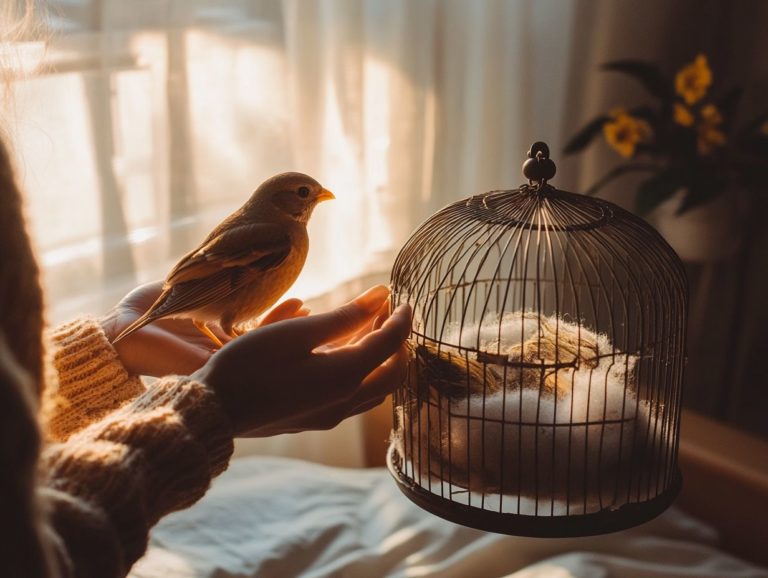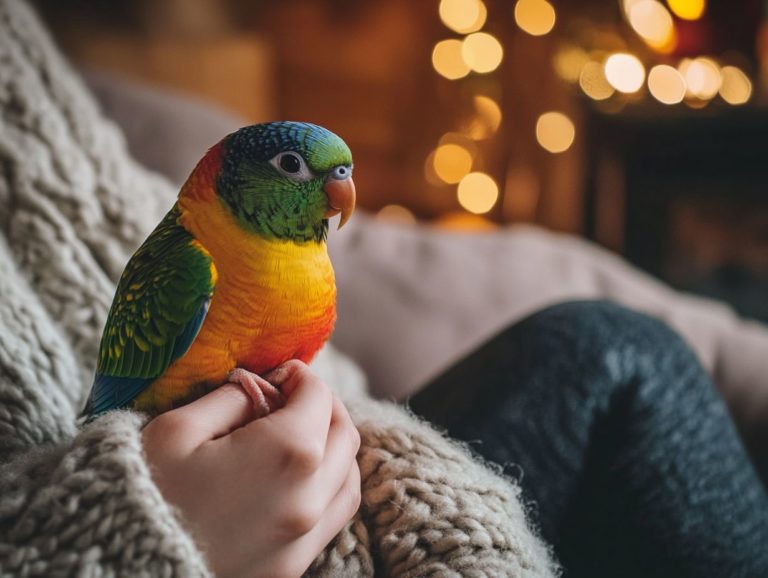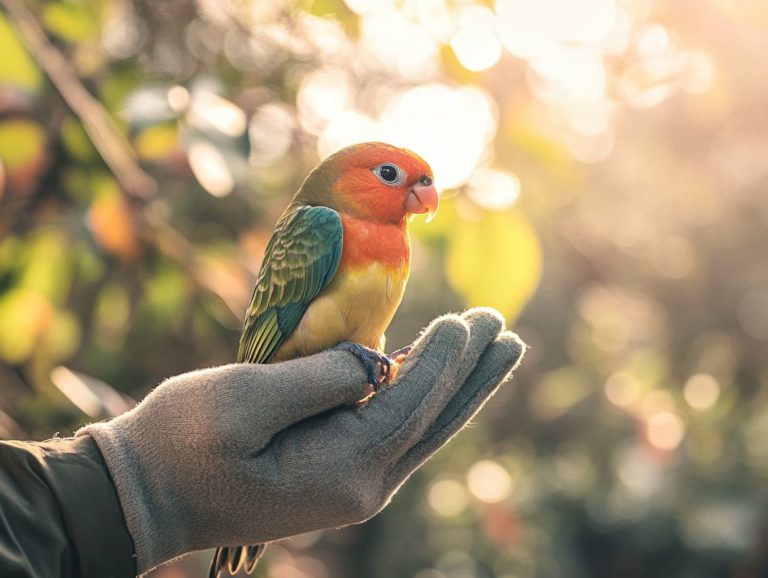How to Prepare for Bird Emergencies?
Birds are truly enchanting companions, but like any pet, they can find themselves in unexpected emergencies.
It’s essential for you to understand the types of emergencies they might encounter and their common causes, including signs of illness. This guide will empower you to create an effective emergency plan, gather essential supplies, and offer insights into managing situations such as injuries, choking, and poisoning.
You’ll also learn when it’s time to consult a veterinarian for professional assistance. Equip yourself with the knowledge to ensure your feathered friend remains safe and sound!
Contents
- Key Takeaways:
- Understanding Bird Emergencies
- Preparing for Bird Emergencies
- How to Handle Bird Emergencies
- Seeking Professional Help
- Frequently Asked Questions
- What are some essential items to have in a bird emergency kit, including a first aid kit and necessary supplies?
- How should I prepare my home in case of a bird emergency?
- What should I do if my bird becomes injured during an emergency situation?
- Are there any specific bird species that require different preparations for emergencies?
- What is the best way to stay informed about bird emergencies in my area?
- Is it important to have a plan for evacuation in case of a bird emergency?
Key Takeaways:
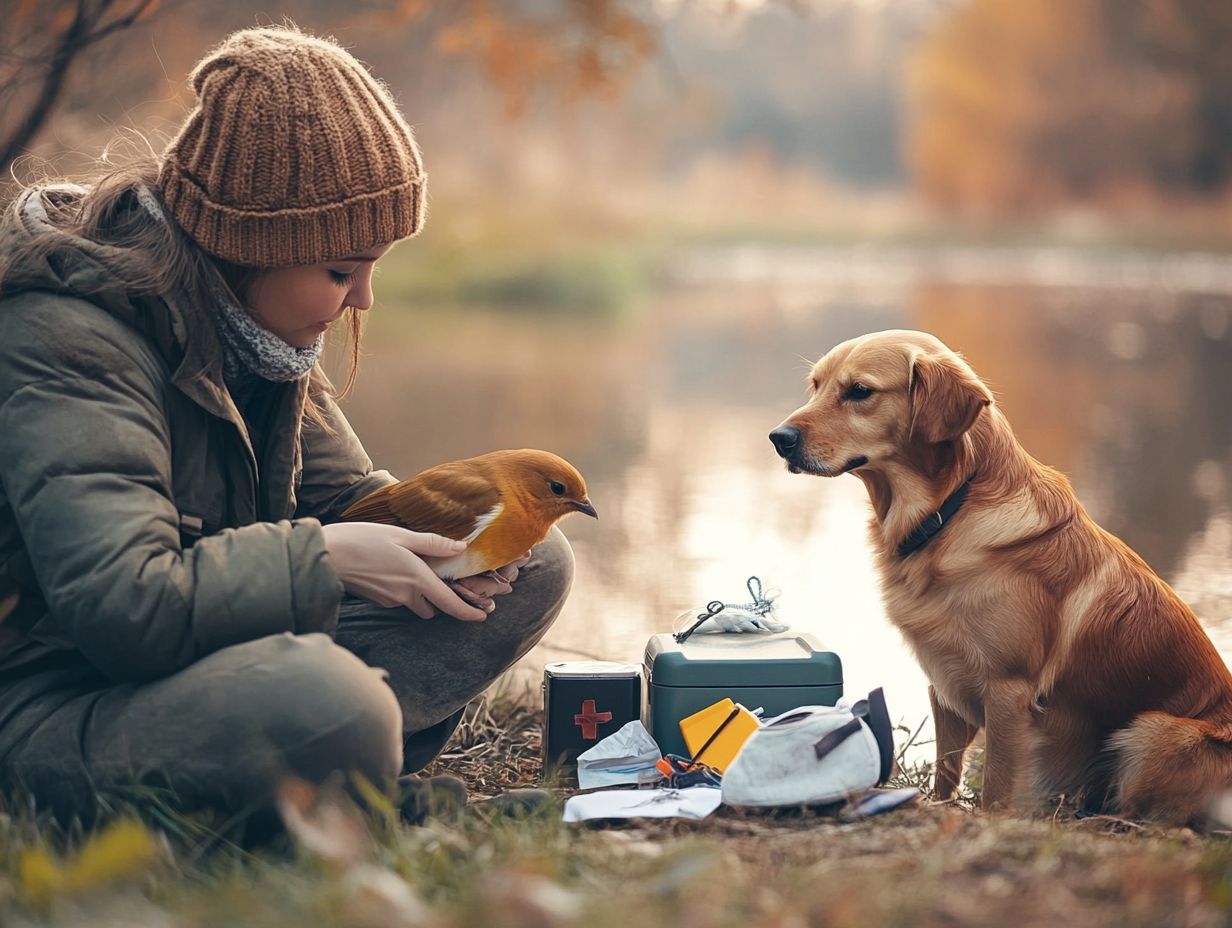
- Be prepared for bird emergencies by creating an emergency plan and stocking up on essential supplies and tools.
- Know how to handle common bird emergencies such as bleeding, choking, and poisoning.
- Seek professional help from a veterinarian or specialized clinics for birds when needed.
Understanding Bird Emergencies
Understanding bird emergencies is essential for every pet bird owner. These situations can arise from various circumstances, including trauma, overheating, or signs of illnesses like stomach issues or respiratory infections.
Recognizing symptoms early can significantly impact the outcome, potentially saving your bird’s life. Common emergencies often present themselves through visible signs of injury, behavioral changes, or unusual droppings.
By being prepared and informed about the types of emergencies that can affect your pet bird, you give yourself the power to act swiftly and effectively, ensuring their health and well-being through proper care and attention to symptoms.
Types of Emergencies and Common Causes
Your pet bird may face several types of emergencies, stemming from various causes such as trauma, overheating, and exposure to toxins. By understanding these potential crises, you can quickly identify critical situations and act accordingly.
Common trauma incidents often include falls from elevated perches or entanglement in household items, both of which can lead to serious injuries. Animal bites whether from a family pet or unwelcome wildlife can also inflict significant stress and physical harm on your bird.
Overheating is another concern when birds are exposed to high temperatures or kept in poorly ventilated areas, which can result in heatstroke. Pet birds can also get sick due to dietary changes, exposure to pollutants, or stress.
Recognizing these risks early on can greatly enhance the well-being of your delicate companions.
Preparing for Bird Emergencies
Preparing for bird emergencies requires you to craft a well thought-out emergency plan and gather essential supplies to safeguard your pet bird’s safety and health. Additionally, knowing how to prepare for a new bird arrival can also be beneficial in ensuring a smooth transition.
A well thought-out emergency plan includes immediate first aid measures, along with training and supplies that can stabilize your bird in a crisis, addressing potential injuries and ensuring proper care.
Creating an Emergency Plan
Creating an emergency plan for your pet bird is crucial to safeguard their safety and well-being in urgent situations. This plan should outline key actions, such as where to transport your bird and whom to contact for immediate veterinary care in case of any signs of illness.
Include a comprehensive list of emergency contacts, such as your veterinarian and nearby avian hospitals, as well as trusted family members or friends who can step in during a crisis. To facilitate swift evacuation, map out potential routes away from your home, avoiding areas that could pose danger or congestion.
Designating a specific travel carrier that is both easily accessible and comfortable for your bird is equally important, ensuring safe transport during emergencies.
Being prepared can make all the difference in a crisis. It boosts your chances of a safe escape for your beloved bird! Act now to protect your feathered friend!
Essential Supplies and Tools
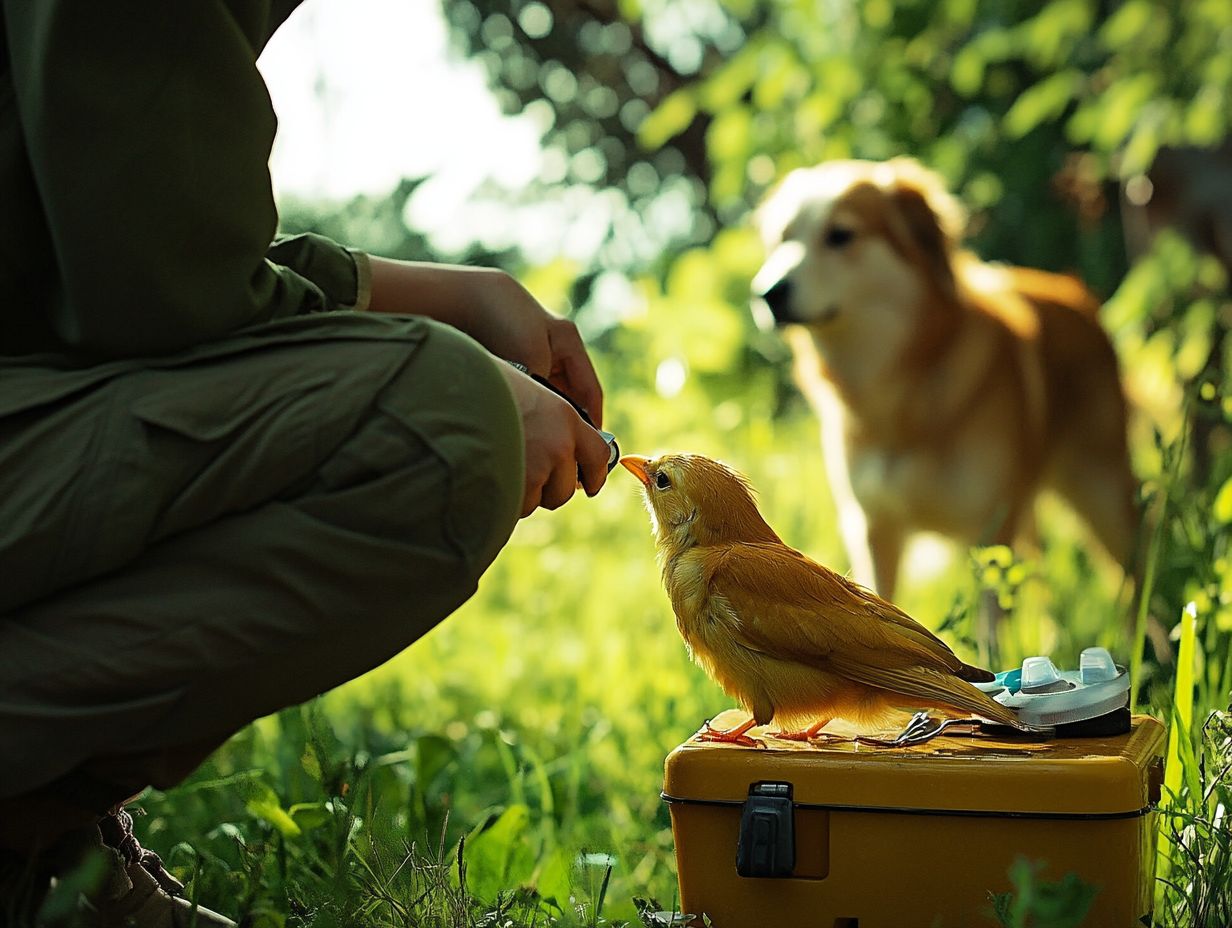
Essential supplies and tools are vital for managing bird emergencies with confidence. A well-stocked first aid kit should include must-haves like antiseptic, saline solution, and a special drink to help birds recover from dehydration to tackle common health issues your pet bird may face, including dehydration from overheating or illness.
Having a gram scale is imperative for closely monitoring your bird’s weight, as this can be a crucial indicator of their overall health. Any fluctuations in weight could signal underlying health concerns that warrant immediate attention.
Include these essentials in your kit:
- Sterile gauze for bandaging wounds
- A pair of tweezers for removing splinters or foreign objects
- Veterinary-approved pain relief medication
- A small pair of nail clippers to maintain proper nail length and prevent injuries
Each of these tools serves a unique purpose and can make a significant impact during unforeseen situations, ensuring your pet receives timely care and appropriate first aid when it matters most.
How to Handle Bird Emergencies
Navigating common bird emergencies demands swift action and a solid grasp of first aid techniques specifically designed for avian care. Situations like bleeding, choking, or poisoning can escalate rapidly, making it imperative for you to intervene promptly to stabilize your pet bird s condition.
Your knowledge and readiness can make all the difference in those critical moments, especially when managing pain and providing necessary first aid.
Bleeding and Injuries
Bleeding and injuries in pet birds can arise from various situations, and knowing how to respond is absolutely vital. Immediate care, such as applying direct pressure to the wound and assessing the severity of the injury, is essential for preventing further complications.
Common types of injuries include beak injuries from cage bars or toys, which can result in painful breaks or cuts, as well as feather plucking that leads to skin abrasions. When faced with bleeding, it’s important to stay calm stress can exacerbate your bird’s condition. After applying pressure, gently clean the area with lukewarm water and a soft cloth to remove any dirt and debris.
If bleeding persists for more than a few minutes or if your bird is exhibiting signs of significant pain like reluctance to eat or excessive flapping don’t wait! Get professional help immediately!
Always be prepared to offer your avian companion the best care possible.
Choking and Respiratory Distress
Choking and respiratory distress in pet birds are serious emergencies that demand your immediate attention. Recognizing the symptoms associated with these issues is crucial for providing prompt assistance and ensuring your bird’s safety. These situations can escalate rapidly, leading to severe complications or even death.
As a responsible pet owner, you should be on the lookout for signs such as gasping, wheezing, open-mouth breathing, or unusual vocalizations these indicate that your bird may be in distress. Changes in coloration, lethargy, or difficulty perching can signal a respiratory emergency that requires urgent care.
If you find your bird choking, take a deep breath and keep calm while ensuring the environment is quiet to minimize additional stress. Gently restrain your bird and, if possible, hold it upright. Applying gentle, steady pressure to the breastbone can sometimes help dislodge the obstruction. It s vital to act swiftly yet carefully, as rough handling could cause further harm.
Should you be unable to clear the airway, or if respiratory distress continues, seek professional veterinary help immediately.
Birds are delicate creatures, and only a trained avian vet can provide the advanced care they need, whether through oxygen therapy or emergency procedures. Staying informed about these critical situations can significantly improve your bird’s chances of a positive outcome.
Be proactive about learning first aid techniques to ensure your pet’s safety and health.
Poisoning and Toxins
Poisoning and exposure to toxins are serious concerns for you as a pet bird owner. They can lead to severe health issues or even tragic outcomes. Early recognition of poisoning symptoms is vital for an effective emergency response.
Be aware that many common household items can pose risks, including specific plants, pesticides, and contaminated food. For example, ingestion of avocado or chocolate can be particularly harmful, resulting in signs like lethargy, vomiting, or difficulty breathing. Staying vigilant about hazards in your bird’s environment is essential.
If you notice any signs of poisoning, the first step is to remove your bird from danger and promptly contact a veterinarian who specializes in bird care. Quick action can be life-saving, and professional guidance is crucial for appropriate treatment and to prevent future exposure to toxins.
Seeking Professional Help
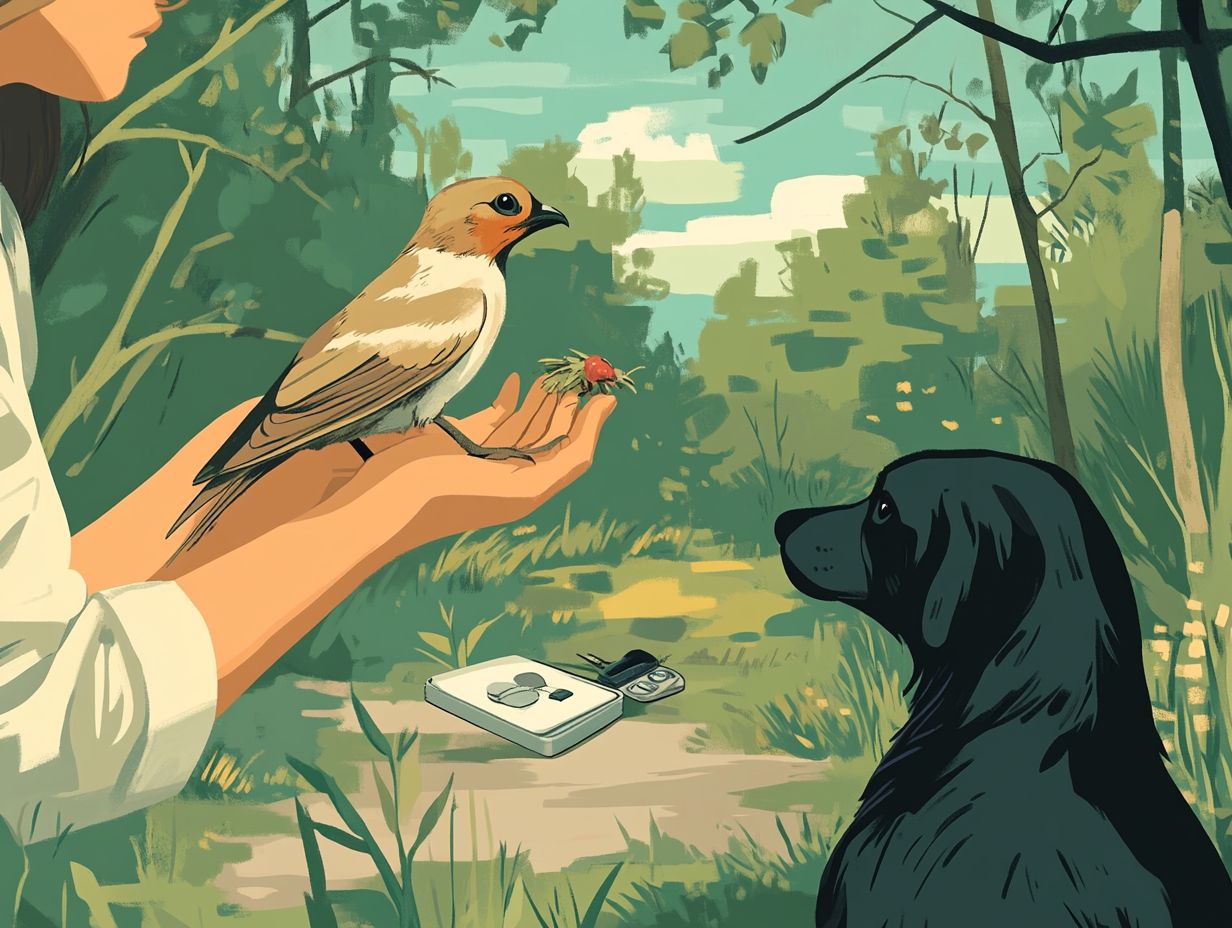
Seeking help from an avian veterinarian is essential during bird emergencies. Prompt medical attention can greatly influence your bird’s recovery, especially in cases of trauma or infection.
Know when and how to contact your veterinarian or an emergency clinic. Timely assistance is key in stabilizing your bird’s condition.
When to Call a Veterinarian
Knowing when to call a veterinarian is challenging for pet bird owners. Certain symptoms may signal serious health issues. If you notice signs of illness like changes in behavior, appetite, or droppings consult a veterinary professional without delay.
Birds have a talent for masking their discomfort, which makes spotting health problems tricky. If you observe sudden changes in activity level, such as lethargy or unexpected aggression, pay close attention immediately.
Look for indicators such as ruffled feathers, discharge from the eyes or nose, or unusual vocalizations, as these may point to distress. Any shift in eating habits, whether it s excessive thirst or a complete refusal of food, should never be dismissed; these changes often hint at underlying medical conditions.
Regularly monitoring droppings is crucial. Any deviation in color, consistency, or frequency can be a vital indicator of your bird s health status. Prompt veterinary intervention can be lifesaving, ensuring that your beloved pet receives necessary care before a minor issue spirals into a major health crisis. Be alert for signs of bleeding or swelling that may indicate further complications.
Locating an Avian Emergency Clinic
Locating an avian emergency clinic is essential for pet bird owners, particularly in a crisis when every second counts. Knowing where to take your feathered friend for immediate care can be the deciding factor in an emergency.
To enhance your preparedness, explore online resources like veterinary directories and social media groups focused on bird care, where fellow bird enthusiasts share experiences and recommendations. Connecting with local bird clubs or pet shops can also provide valuable insights into reliable clinics.
Make it a priority to save the contact information of nearby facilities on your phone or keep a printed list handy. This way, you ll have necessary details at your fingertips when urgency strikes. Regularly reviewing these resources will help you feel more confident and organized, ready to spring into action when your beloved bird needs you most.
Frequently Asked Questions
What are some essential items to have in a bird emergency kit, including a first aid kit and necessary supplies?
In case of a bird emergency, it’s important to have a bird first aid kit, a travel cage, a heat source, and necessary medication on hand, such as antibiotics for potential infections.
How should I prepare my home in case of a bird emergency?
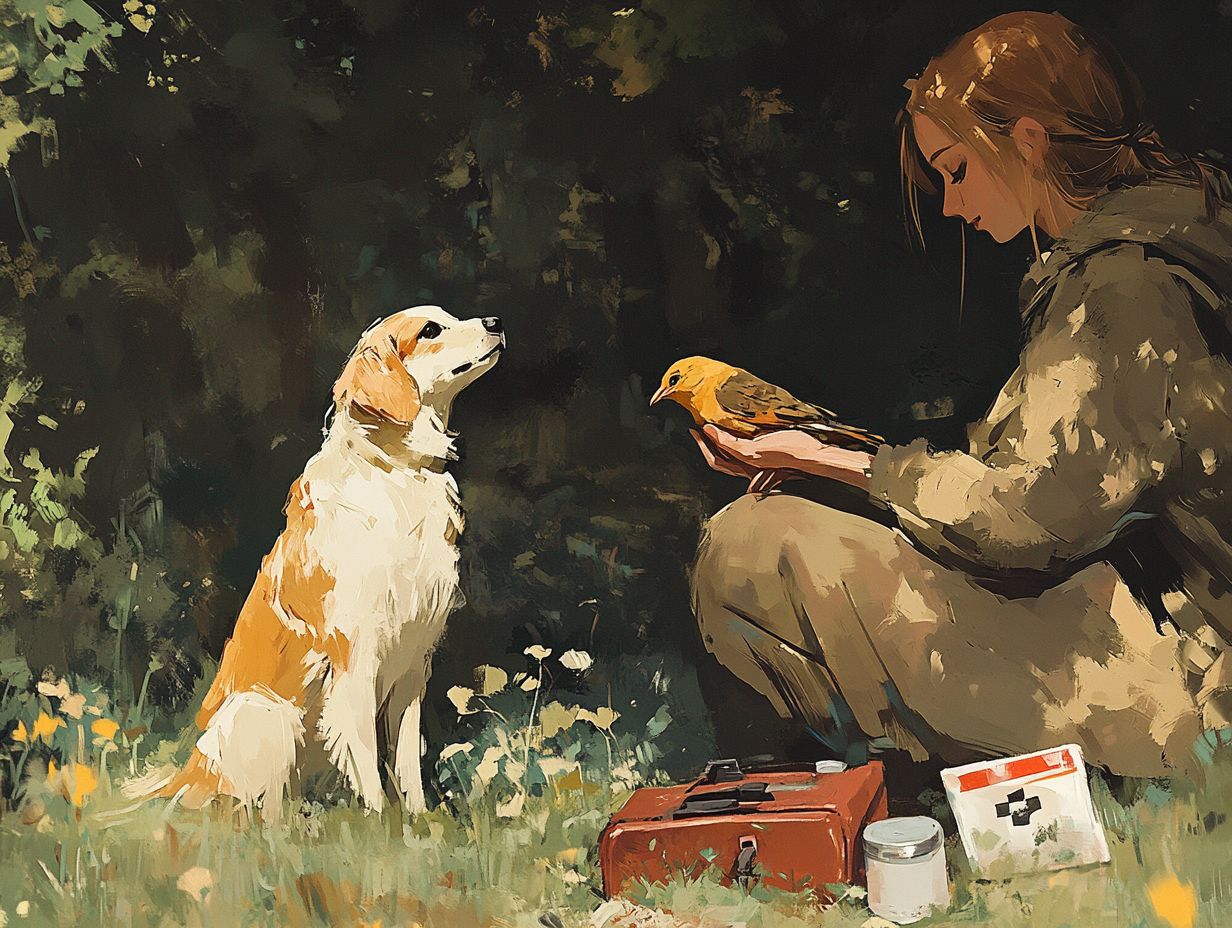
Make sure to have a designated safe and warm area for your bird. Secure any potential hazards like open windows or toxic plants.
Use a heating pad if necessary to maintain an appropriate temperature.
What should I do if my bird becomes injured during an emergency situation?
The first step is to remain calm and assess the situation. If necessary, give first aid and get veterinary help right away.
Are there any specific bird species that require different preparations for emergencies?
Some bird species have specific needs during emergencies. For example, tropical birds may need a heat source or special avian rehydration solutions, which are fluids designed to keep birds hydrated during stressful situations.
What is the best way to stay informed about bird emergencies in my area?
Sign up for local emergency alerts to stay ahead of potential bird emergencies in your area, including alerts for overheating or extreme weather conditions.
Is it important to have a plan for evacuation in case of a bird emergency?
Yes, it’s crucial to have an evacuation plan. This ensures the safety of both you and your bird in case of sudden emergencies, such as a natural disaster or fire. Include an evacuation kit with essentials for your bird’s care.

